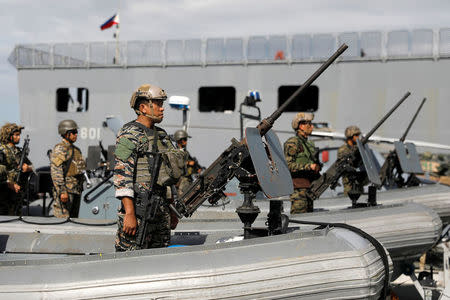Philippines warns against lone wolf attacks after Marawi victory

MANILA (Reuters) - More than a week after the Philippines declared victory over pro-Islamic State militants in Marawi, security officials on Friday expressed concern over lone wolf attacks, with Australia issuing a "high threat" alert about travel to Manila.
Skirmishes continued between soldiers and holdouts from the Islamist militant group that seized a lakeside town on the southern island of Mindanao. More than 1,100 people, including 165 troops, were killed in the five-month conflict.
"One concern after Marawi is the possibility of threats from lone wolves," defence department spokesman Arsenio Andolong told reporters, two days after an Uzbek plowed into New York pedestrians and bikers in what U.S. officials called a terrorist act.
The army remained on high alert after President Rodrigo Duterte said five cities in Mindanao were potential targets of Islamist militants after their defeat in Marawi, he added.
On Friday, the Australian embassy issued a travel advisory, warning of "a high threat of terrorist attack" in the Philippines, including Manila, the capital.
"Be alert to possible threats around locations that have a low level of protective security and places known to be possible terrorist targets," it said.
It told Australians to reconsider travel plans to eastern Mindanao and avoid its central and western regions.
The advisory was similar to one issued early this year, said military spokesman Major-General Restituto Padilla.
"It was only a reiteration, there is no credible threat," he added.
Two days ago, army soldiers killed the righthand man of Abu Sayyaf leader Isnilon Hapilon, the emir of pro-Islamic State militants in Southeast Asia, who was gunned down last month. His death hastened the collapse of the Marawi-based militant group, leading to its defeat.
(Reporting by Manuel Mogato; Editing by Clarence Fernandez)

